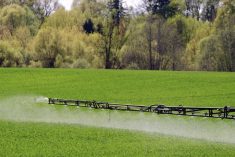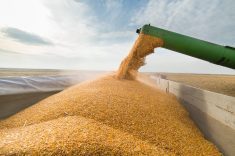The United States has halted imports of beef products from one of Canada’s largest beef-processing plants, owned by Alberta’s XL Foods, due to findings of E. coli bacteria.
A spokesman for the Canadian Food Inspection Agency (CFIA) said on Tuesday that U.S. Food and Drug Administration officials had "de-listed" the plant at Brooks, Alta. on Sept. 13, meaning that it cannot export any of its products to the U.S. until corrections are made.
"Which is normal, when there are positive findings from a facility," said CFIA spokesman Tim O’Connor.
Read Also

Alberta crop conditions improve: report
Varied precipitation and warm temperatures were generally beneficial for crop development across Alberta during the week ended July 8, according to the latest provincial crop report released July 11.
XL Foods voluntarily recalled more than 250 meat products this month after positive findings of O157:H7, an E. coli strain that can cause potentially life-threatening illness.
Canada is the sixth-largest beef and veal exporter in the world.
Products subject to XL’s recall were distributed to various retailers and processors in Canada and to U.S. processors and other establishments in eight states, according to the U.S. Food Safety and Inspection Service (FSIS), which had issued public health alerts on the affected products on Thursday and Friday.
The CFIA has completed its review of the plant’s food safety controls and found XL Foods could not demonstrate that it regularly updated its plan to control E. coli in the facility, the agency said.
While CFIA’s review "did not identify one single factor that would lead to E. coli O157:H7 contamination, the combination of several deficiencies could have played a role," the agency said Monday.
"By themselves, each of these findings would not typically signal an immediate concern during the course of normal inspection activities."
"Deviations"
It’s "not uncommon" to detect E. coli in slaughter facilities, which are expected to have "adequate measures" to monitor higher-than-normal detection rates and modify their controls accordingly, CFIA said.
At the Brooks plant, CFIA said, "this trend analysis was not always conducted consistently" and "deviations were noted from the company’s documented E. coli O157:H7 control measures and sampling and testing procedures."
An official with XL Foods referred a request for comment to a company spokesman, who could not be reached.
Federal Agriculture Minister Gerry Ritz, under questioning from opposition legislators in Ottawa, said the CFIA took swift action to control the movement of potentially contaminated products.
"None of the product made it to store shelves," he said.
Health authorities have not established any link to date between this recall and any illnesses, both the agency and Ritz noted.
CFIA, as of Monday, has issued seven alerts in recent weeks identifying products affected by the recall.
The O157:H7 strain of E. coli is commonly associated with raw and undercooked beef, unpasteurized milk and untreated water. Symptoms include severe stomach cramps, diarrhea and vomiting.
Up to 15 per cent of children and a smaller proportion of adults sickened with O157:H7 develop hemolytic uremic syndrome (HUS), from which most recover within a few weeks, though some patients can develop serious or fatal damage to their kidneys or other organs.
XL has owned the Lakeside Packers plant at Brooks since 2009, having bought it from U.S. meat giant Tyson Foods.
— Reporting for Reuters by Rod Nickel in Winnipeg and Randall Palmer in Ottawa. Includes files from AGCanada.com staff.



















